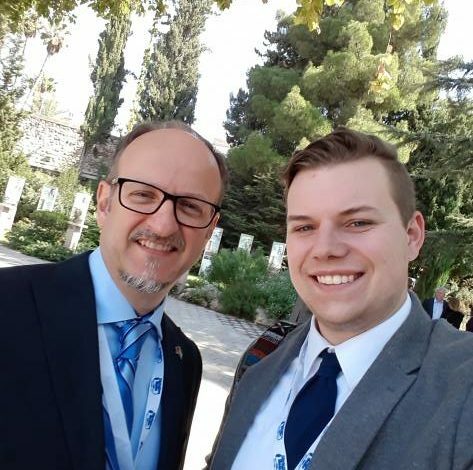
Israeli entrepreneurship seems to be having a remarkable impact on the world. But how do secular and faith-based media perceive the nation and its many accomplishments?
This was one of the main topics on the agenda of the inaugural Christian Media Summit in Jerusalem. Dwight Widaman, founder and editor of Metro Voice in Kansas City, was among the 200 attendees. The press office of Prime Minister Benjamin Netanyahu and the East Jerusalem Development Office sponsored the summit.
“It was an eye-opener for me both professionally and personally,” Widaman said. “This was my fourth trip to Israel, but on every trip you discover something new and exciting.”
He previously had visited Israel in 2002 and 2007 as part of EPA partnerships with the Israel Ministry of Tourism and then privately with his family in 2015. On this trip he was joined by his son-in-law who serves as digital media editor for metrovoicenews.com.
Widaman said he has always had a love for the Holy Land, with a particular interest in how that rich history is now juxtaposed with a modern Israel that has become one of the world’s most technologically advanced countries.
“So much of what we use every day is a result of Israeli research and development,” he said, “from cherry tomatoes to the most popular phone apps, to flash drives and the very first computer processor for PCs developed by Intel Israel.”
It would be difficult, if not impossible, for the world to function as it does now without the technology and innovation that has come out of Israel, Widaman said. Israel is second only to the United States in new patents each year.
“People don’t realize that 80 percent of the banking industry uses online security developed by Israeli companies,” he said. “If we were to function without these things, we would be living like it was 1982.”

Most visitors don’t see this side of Israel, and summit organizers were eager to share. Many of the panelists were secular Israeli media professionals who gave the Christian journalists a unique perspective. They admitted that Israel, as the only functioning democracy in the entire Middle East, still must deal with other issues, such as religious freedom, that usually grab the headlines. With Christians virtually disappearing from vast areas of the region, Israel is a different story.
“You go to the holy sites, you go to the churches, others go to the mosques, and you know that this is a free city,” Netanyahu said during an evening event at the Israeli Museum in the capital city of Jerusalem. Israel is the one country in a vast region where Christians not only survive – they thrive.”
Netanyahu is one of the few world leaders actually speaking out on behalf of Christians being persecuted in Iran.
“I want to focus on Iran’s war against Christians,” he told participants. “Christians are brutally persecuted… Christians have been lashed for sipping wine during prayer services; Christians have been brutally tortured for doing nothing more than practicing their faith. Some world leaders are willing to ignore this repression and seek to appease Iran, but I am not one of them.”
That message resonated with many journalists who themselves live in nations where Christianity is under pressure. Widaman shared that one of the most exciting and unexpected aspects of the summit was that more than 80 percent of attendees were from nations other than the United States and Canada.
“We seem to have a fairly insular perspective in North America,” he said. “To get to know journalists from around the world, both professionally and personally, gave me a new sense of the vitality of Christian media in areas of the world we may not have expected it to exist.”
Widaman was excited to have met both print and electronic media professionals from countries as diverse as Nepal and Finland, Denmark and South Africa.
“In particular, Christian print media seems to thriving in comparison to what we see in North America,” he said. “I met a publisher from Finland whose newspaper is distributed across the entire country. And it’s a paid daily.”
It was the same story when he talked to journalists and editors from Denmark and South Korea.
“We tend to talk a lot about reading habits and we point a finger at the Internet for the demise of print,” he said. “But these Christian communities around the world, with access to the same technology as those of us in North America, seem to value Christian print journalism to a greater degree than we do. Maybe it’s because they are under more pressure culturally or politically, which has caused them to support serious work through something tangible like a magazine or newspaper. I don’t know.”
“It’s interesting to come to that realization in Jerusalem–the birthplace of Judaism and Christianity and now the epicenter of technological advancement. The fact is that this new paradigm cannot be fixed with the latest app or mobile-ready website.”
The summit, while focusing on issues unrelated to the health of Christian media, provided the backdrop for networking and dialogue among a diverse group of secular journalists from Israel and Christians journalists serving in vastly different corners of the world. “It’s not what I expected when I attended,” Widaman said, “but it was one of the most treasured experiences I brought home.”
–Reprinted from the Evangelical Press Association








